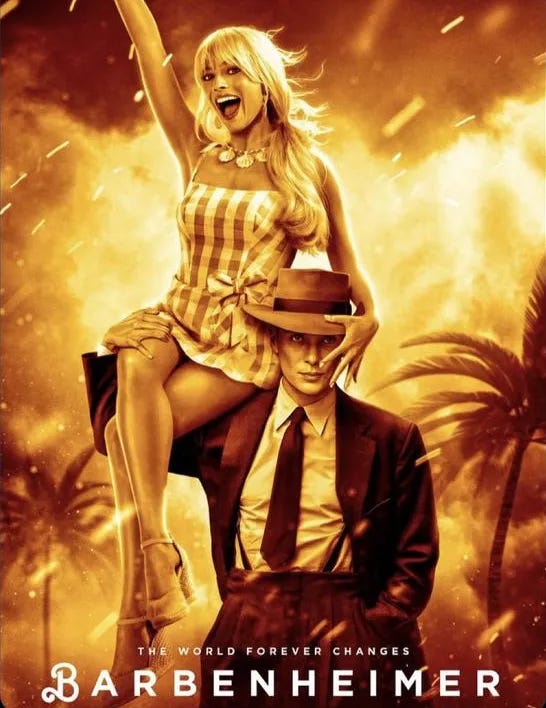Greg Mitchell is the author of a dozen books, including “Hiroshima in America,” “Atomic Cover-up,” and the recent award-winning “The Beginning or the End: How Hollywood—and America—Learned to Stop Worrying and Love the Bomb.” He has directed three documentary films since 2021 for PBS (including “Atomic Cover-up”) . He has written about the atomic bombings for over forty years. You can subscribe to this newsletter for free.
Despite its global popularity last summer and early fall, including in China and other Asian markets, it was no shock to find that a wide release in Japan was kept on hold. Might have happened anyway, but this was guaranteed after Japanese protested some of the early “Barbenheimer” promotion there, which I wrote about here. Sample of an offending poster:
Some Japanese Twitter users responded with photos of the 1945 bombing victims.
Yesterday we finally got word of a release in Japan, with no fixed date but likely in spring, for Oscar season, which even there gets wide attention. The distributor has the rather too on-the-nose name, Bitters End.
In a statement carried in Japanese media, the firm said it had taken the decision after lengthy discussions that took into account the backlash it had sparked in Japan after it went on international release at the same time as the comedy movie Barbie in July. “The film’s subject matter is of great importance and holds special meaning for Japanese people, so we decided to release it in Japan after various discussions and considerations,” Bitters End said.
And there was this in the Los Angeles Times:
Jeffrey J. Hall, who researches pop culture in Japan, said the news of the film’s release was warmly received, becoming the country’s No. 1 trending topic on X, formerly Twitter, after it was announced.
“There was definitely a sense of exclusion among Japanese cinephiles,” Hall, a special lecturer at Kanda University of International Studies outside Tokyo, said in an email. “Even if the subject matter of the film might be a bit uncomfortable for Japanese viewers, the fact that it was created by a world-famous director will be reason enough for many viewers to give it a chance.”
“I don’t think there will be a repeat of the Barbenheimer controversy,” Hall said, “provided that Japanese distributors approach the subject matter in a tasteful manner.”





Will you watch 'Godzilla Minus One' sometime soon? I'd love to read your thoughts on it, as it takes place in the days/year or two after WWII in Japan.